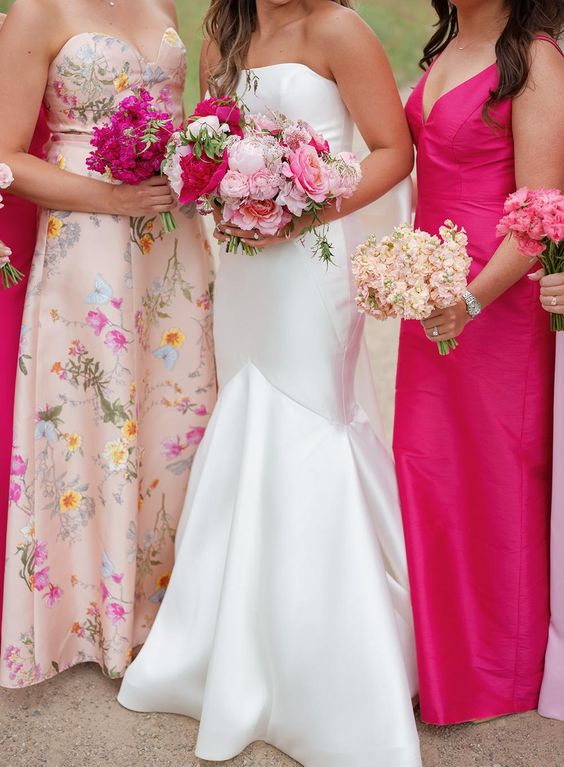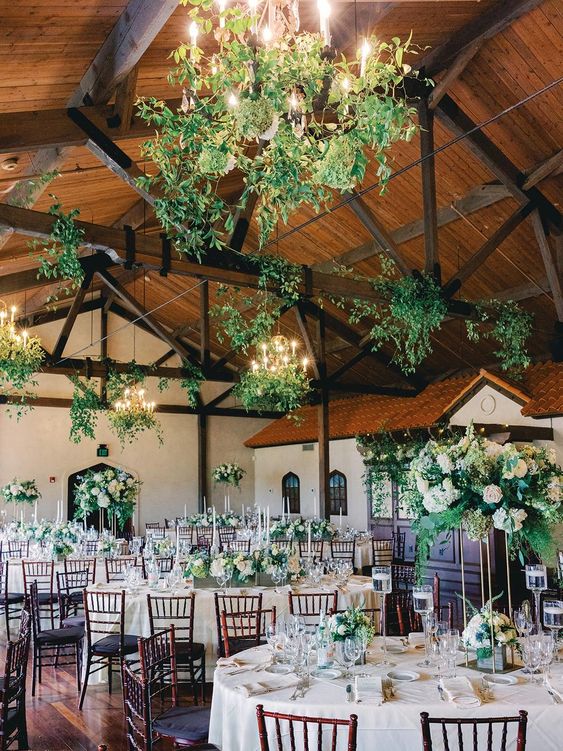One of the most challenging parts of creating your wedding budget? Determining exactly who pays for what!
While modern couples tend to take on most of the financial responsibility themselves, it’s still common for family members and the wedding party to contribute in certain areas.
If you’re currently working on your wedding budget and wondering who traditionally pays for what, read on for our guide on wedding budget etiquette below – from your engagement party right through to your reception.

Wedding Budget Etiquette: Engagement Party
The engagement party is often the first event in the wedding timeline, and was traditionally hosted by the bride’s family. This celebration is usually an intimate affair, where close family and friends will gather to toast your upcoming nuptials. However, in modern times, it’s more common for the couple themselves to host the engagement party.
Who pays?
- Tradition: The bride’s family
- Modern alternative: The couple or close family may host and cover costs. Regardless of who’s hosting, keep in mind that it’s considered impolite to ask guests to pay their own way.
Remember, your engagement party doesn’t have to be elaborate – a casual barbeque at home can be a great way to celebrate with your loved ones.
Read our engagement party etiquette guide here!
Wedding Budget Etiquette: Bachelorette/Bachelor Parties
Bachelor and bachelorette parties are all about celebrating with your closest group of friends before the wedding. They can be simple one-day events, weekend getaways or multi-day holidays!
Who pays for the Bachelorette Party?
- Tradition: The wedding party and attendees would traditionally plan and pay for these parties
- Modern alternative: These days, it’s still customary for attendees to cover the costs of planning, while the wedding party may chip in extra for certain expenses. For parties that involve travel, it’s expected that everyone attending will cover their own travel, accommodation, and activity costs.

Wedding Budget Etiquette: Bridal Shower
Bridal showers are usually an intimate gathering with the bride’s closest female friends and family. They can range from a simple afternoon tea at home to a more elaborate event at a venue, so costs may vary.
Who pays for the Bridal Shower?
- Tradition: The maid of honor (with help from the bridesmaids) and/or close family members would traditionally plan and pay for these parties
- Modern alternative: These days, the bridal shower is usually still hosted by the wedding party and/or close family. It’s not considered correct etiquette to ask guests to contribute financially, as they’ll already be bringing a gift. However, if the bride has specific preferences that may add to the cost, she may also offer to chip in or help with some of the organization.
Read our guide on planning the perfect bridal shower here!

Wedding Budget Etiquette: Wedding Party Expenses
Understanding who pays for what is one of the trickiest parts about having a wedding party! With so many expenses (from dresses and shoes to hair and makeup), it can be hard to know what the correct etiquette is.
Who pays for the Wedding Party?
- Tradition: Bridesmaids and groomsmen are responsible for their wedding day attire, with the couple covering all other costs
- Modern alternative: The bridal party is typically still expected to pay for their outfit, as long as there is flexibility with style and cost. The couple then usually covers the costs for other expenses such as accessories and hair and makeup.
To avoid any surprises, it’s best to communicate expectations with your wedding party early in the planning process. Read our comprehensive guide on bridal party costs here!

Wedding Budget Etiquette: Rehearsal Dinner
The rehearsal dinner typically takes place the night before the wedding, following a ceremony run-through with the wedding party. Depending on the style of your wedding, it can be a relaxed or formal event where the couple, their immediate families, and the wedding party can gather for a meal and celebrate together before the big day.
Who pays for Rehearsal Dinner?
- Tradition: The groom’s family would typically pay for the rehearsal dinner
- Modern alternative: The couple may choose to cover the costs themselves, especially if they want more control over the style and venue.
Wedding Budget Etiquette: Ceremony and Reception
The wedding ceremony and reception are, of course, the biggest expenses to think about! This includes everything from flowers to catering, stationery, furniture and more. Read our ultimate wedding budget checklist here to figure out exactly what needs to be included in your budget.
Who pays for the Ceremony and Reception?
- Tradition: The bride’s family would traditionally pay for the ceremony and reception, while the groom’s family would cover the rehearsal dinner and honeymoon
- Modern alternative: Many couples now cover the majority of their wedding day costs themselves, with families offering contributions where possible.
If family members are offering to help, it’s important to have an open and respectful conversation about what they’re willing to contribute. Keep in mind that financial contributions often come with expectations, so be sure to establish boundaries early on!

Breaking Down Your Wedding Budget
At the end of the day, there are really no set rules when it comes to splitting costs for your wedding. Every couple is different, so simply use the above guidelines as a starting point but tailor them to suit your personal circumstances!
Need some help breaking down your wedding budget? Read our ultimate wedding budget breakdown guide for modern couples here.






